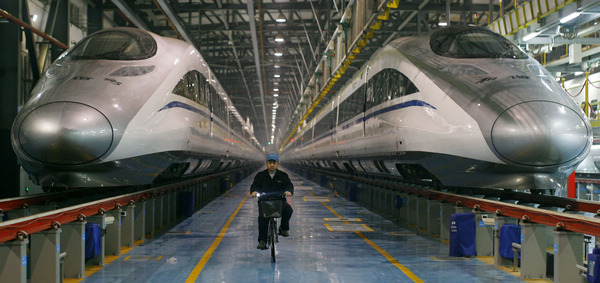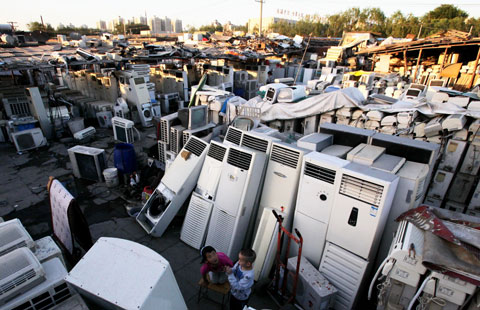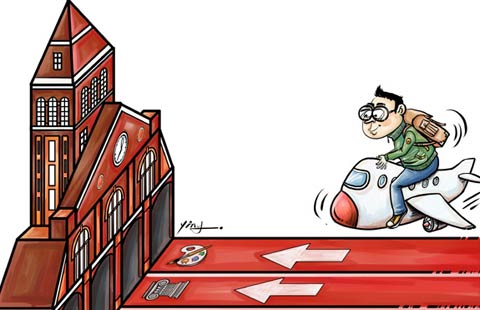Constructive partnership will build foundations
By Zhang Yuwei (China Daily) Updated: 2012-03-06 07:59How Chinese can help reshape US infrastructure, Zhang Yuwei reports from New York.
For the past few years, China has been rapidly building its infrastructure. The pace has been so fast, in fact, that many people say the United States could learn a thing or two.
And they say it for a reason.
High-speed rail lines, airports and train stations are springing up nationwide, while in Beijing alone four new subway lines will start operation this year, taking the city's network past the 450-kilometer mark.
By contrast, US infrastructure is crumbling.
|
 |
Two years ago, New Jersey canceled a project to build a tunnel between the state and New York's Manhattan district because of short-term budgetary gaps. Commuters instead take trains that share a tunnel under the Hudson River with Amtrak, the national rail carrier, running on tracks built in 1910.
Nearly one-third of roads in the US are in poor or mediocre condition, and one-fourth of its bridges are either structurally deficient or functionally obsolete, according to the American Society of Civil Engineers, which rated the US transit system "D" in its annual infrastructure report.
The World Economic Forum's economic competitiveness ranking showed the overall US infrastructure rating has fallen from 8th place to 16th in the past three years, while China rose from 46th to 44th.
US President Barack Obama has on many occasions stressed the need to rebuild his country's infrastructure.
In the 2013 budget he sent to Congress on Feb 13, he proposed more than $350 billion in short-term measures for job growth, including an investment of $50 billion toward the surface transportation re-authorization bill for roads, rails and runways.
Last year, in his speech on a job creation plan, Obama proposed spending $80 billion on infrastructure, $30 billion of which is for repairing and renovating schools.
Yet, even that amount cannot compare with what China has committed to infrastructure construction.
China's Ministry of Railways said it will spend about $300 billion on building transport systems through 2020, while the US Federal Railroad Administration plans to commit about $8 billion in similar projects in 2012.
Industrial experts point out what the US government lacks most is funding and this is where Chinese companies can step in and help rebuild the US infrastructure.
Yuan Ning, president of China Construction America, a wholly owned subsidiary of China State Construction Engineering Corp, said the perfect way for China and the US to collaborate is through a public-private partnership. PPPs are government services or private-business ventures funded and operated through a partnership of the government and one or more private-sector firms.
Chinese companies can bring expertise and capital and can work with the US government on various infrastructure projects, Yuan said. "It's a win-win solution."
Robert Hormats, US under secretary for economic growth, energy and the environment, agreed that PPPs are a good way to work with Chinese companies in infrastructure projects.
"Chinese investment can be really helpful," he told China Daily after the Bloomberg China Conference in New York on Feb 1. "We would love to have more of that, and we will be pursuing that dialogue with the Chinese."
China's Commerce Minister Chen Deming said he was impressed by the high quality of US subways and other infrastructure when he visited 20 years ago, but many roads, railways and ports today need renovation.
The country hopes to achieve cooperation with the US on infrastructure, he told members of the American Chamber of Commerce last year, adding: "We are willing to turn some of our holdings of your debt into investment in the US, hoping to create jobs for the US."
Bill Graves, president of the American Trucking Associations, said the Obama administration and Congress both need to focus on finding funds for infrastructure.
"In order to do this efficiently and safely, we need the administration and Congress to come together on a well-funded multiyear highway bill that makes smart investments in roads and bridges with real dollars," he said in response to Obama's State of the Union speech in January, which called for rebuilding US infrastructure.
- Seven villagers murdered in N China
- China steps up tobacco control efforts
- Five jailed for separatism in Xinjiang
- Letter asks for leniency in poisoning case
- Antibiotics in surface water pose 'indirect health risk'
- Tianjin airport opens up transit link to Beijing
- High levels of antibiotics in China's major rivers
- China to dig tunnel for Asian rail system
- Bering strait line to US possible, experts say
- China: Stop oil rig harassment








